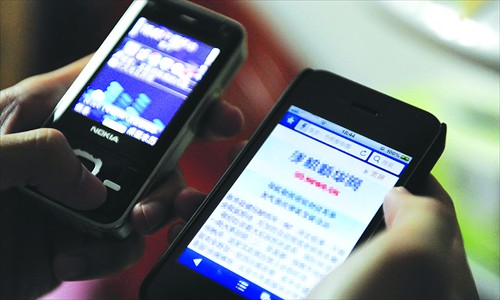
The capital will upgrade its Wi-Fi network to cover public transportation services by the end of March, and some parts of the city may even have access to the speedier 4G services around the same time, telecom companies have promised.
However, the much vaunted free Wi-Fi service in Beijing does not yet appear to be working well, with users complaining of patchy connectivity and slow speeds.
"We're testing the technology on 60 buses on the Second Ring Road, and should be finished no later than the end of March," said He Ning, general manager of China Mobile Group Beijing Company. He was addressing Beijing People's Congress and the municipal Chinese People's Political Consultative Conference at the weekend.
According to He, the company is currently troubleshooting signal stability, which could be influenced by bumps and jolts when the bus is in motion. The technology is expected to be installed at bus stations in the future, he said.
The free Wi-Fi project, led by China Mobile, is in cooperation with Beijing Public Transportation Company (BPTC), however, the public transport authority said they are not yet aware of enough details to comment.
"It sounds like the service will be welcomed by residents, but as far as I know, it still hasn't been prepared well enough to announce anything yet," said Cui Jian, the publicity director of BPTC.
He Ning also announced a 4G network in certain areas of the city was already on the agenda, although China Mobile's office and its publicity director could not be reached yesterday to comment further on the 4G plans.
Upgrading the capital's mobile service to 4G will combine the existing 3G service with Wi-Fi, and will include Bluetooth and satellite data, and means much faster connectivity.
"The plan sounds like another vanity project of the government," said Sun Peilin, a mobile Web technology analyst.
"The city hasn't offered free Wi-Fi services yet in most public areas, but now setting up 4G? I see more benefits for the equipment manufacturers than ordinary users," said Sun.
Beijing municipal government set a target to build a leading wireless city at the beginning of last year in areas within the Fifth Ring Road and the central regions of Beijing's suburbs, with 90,000 hotspots to be live by the end of 2011 and another 390,000 being connected over the next five years.
The service was promised to be free by 2014, however, using it comes with restrictions.
The fact that users must register with their mobile phone numbers to get a password aroused concerns about personal information being snooped on.
However, even residents who are comfortable with real-name registration sometimes fail to enjoy the service.
"The signal was unstable; I tried several times to log on the Internet in the Zhongguancun area, supposedly the place with the best Wi-Fi service," said Wei Lei, a local IT engineer.
"When I finally got online, the signal was later cut off," he said.
Last November, Beijing began offering free Wi-Fi across seven of the city's districts, including Xidan, Zhongguancun and at main railway stations.
However, according to an investigation by IT website Zhongguancun Online last month, only Guomao and Zhongguancun could receive signals, all unstable, from the three major telecom operators, China Telecom, China Unicom and China Mobile. There were difficulties accessing the hotspot even in the major retail area of Xidan.
In October, Beijing Municipal Commission of Economy and Information Technology ensured that 2Mbps (megabits per second) "meets the public's demands for online information acquisition." However, Shanghai finished a project to install 7,300 Wi-Fi hotspots with a speed of 54Mbps at most access points, according to Xinmin Evening News Sunday.
"As I've said before, the service can't be ensured as it's for free, because all the operators really only care about signing up fee-paying customers," said Xiang Ligang, CEO of cctime.com, a professional telecom portal in China.
"Hangzhou has provided a free Wi-Fi service since 2007, though people must click on the commercials to log on the network, but at least they enjoy a pretty decent service," said Xiang.

Copyright ©1999-2011 Chinanews.com. All rights reserved.
Reproduction in whole or in part without permission is prohibited.